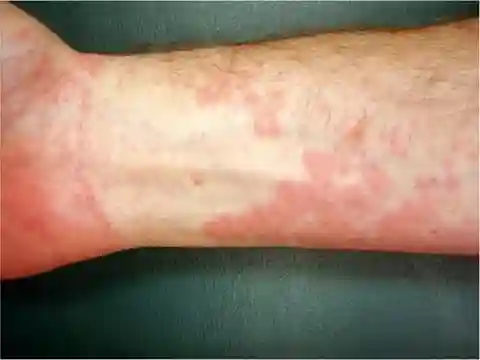What is Erythema Multiforme?
Erythema multiforme is a skin reaction that can be triggered by infections or some medications. It is usually mild and resolves within a few weeks.
There is also a rare, severe form that can affect the mouth, genitals, and eyes and can be life-threatening.
This condition is known as erythema multiforme major. It most often affects adults under 40, although it can occur at any age.
Symptoms of Erythema Multiforme
Most people with the disease will only experience a rash, but other symptoms can sometimes occur. The rash begins suddenly and progresses over several days.
It tends to start on the hands or feet, before spreading to the limbs, upper body, and face.
The following are characteristics of the rash that may appear:
- Starting as small red spots, they can become raised patches several centimeters in size.
- Often has patches with a dark red center that may have blisters or crusts, surrounded by a pale pink ring and a darker outer ring.
- Slight itching or discomfort.
- It usually fades over 2 to 4 weeks.
Other symptoms that may also occur are:
- High temperature.
- Headache.
- Feeling generally unwell.
- Raw sores inside the mouth, making it difficult to eat and drink.
- Swollen lips covered in crust.
- Sores on the genitals, causing pain when urinating.
- Red and painful eyes.
- Sensitivity to light and blurred vision.
- Sore joints.
Causes of Erythema Multiforme
This condition is often associated with the virus that causes cold sores ( herpes simplex virus ). It is also thought to occur when another infection stimulates the immune system to attack skin cells.
Certain medications can also cause a person to develop this condition, such as:
- Nonsteroidal anti-inflammatory drugs.
- Antibacterial drugs.
- Penicillin and penicillin-based antibiotics.
- Anticonvulsant medication.
- Anesthetic drugs.
- Barbiturates.
Receiving immunizations against diseases such as tetanus-diphtheria-acellular pertussis (Tdap) or hepatitis B can also cause a person to develop these diseases.
However, this is rare and the risk is low, so vaccination is still recommended.
Risk Factors for Erythema Multiforme
Some factors that can increase a person’s risk of experiencing this condition are:
- Taking certain medications, such as nonsteroidal anti-inflammatory drugs, antibacterial drugs, antibiotics, anticonvulsants, and anesthetics.
- Receive immunizations against diseases such as diphtheria, pertussis, and tetanus (DPT), or hepatitis B.
Diagnosis of Erythema Multiforme
To diagnose this condition, a doctor will usually conduct a medical interview, direct physical examination, and certain supporting examinations if needed.
During a physical examination, your doctor will evaluate the size, shape, color, and distribution of the skin rash. Your doctor may perform a skin biopsy if needed to rule out other possible causes.
Several other tests can also be performed to detect other infections that are often associated with erythema multiforme, such as mycoplasma (a type of bacteria).
Erythema Multiforme Treatment
Treatment aims to address the underlying cause of the condition, relieve symptoms and stop skin infections.
Some treatments that doctors can do are:
- Stopping any medications that may be triggering symptoms. Don’t try this without talking to your doctor first.
- Antihistamines and moisturizing cream (emollient) to reduce itching
- Steroid creams to reduce redness and swelling (inflammation).
- Painkiller.
- Antiviral tablets, if the cause is a viral infection.
- Anesthetic mouthwash to relieve the discomfort of any mouth sores.
More severe cases may require hospitalization with treatments that include:
- Stronger painkillers.
- Wound dressings to prevent wounds from becoming infected.
- Eat soft or liquid foods if the mouth is severely affected. Some people may need fluids given intravenously.
- Steroid tablets, to control inflammation.
- Antibiotics, if you have or develop a bacterial infection.
- Eye drops or ointment if eyes are affected.
Complications of Erythema Multiforme
Most people with erythema multiforme recover completely within a few weeks. There are usually no further problems and the skin heals without scarring.
However, there is a risk of symptoms coming back, especially if they are caused by the herpes simplex virus. In severe cases, possible complications can include:
- Sepsis.
- Skin infection (cellulitis).
- Permanent skin damage and scarring.
- Permanent eye damage.
- Inflammation of internal organs, such as the lungs or liver.
Prevention of Erythema Multiforme
No one knows of any proven prevention strategies to prevent this condition from occurring.
However, people who have experienced erythema multiforme after taking certain medications need to avoid taking those medications in the future.

